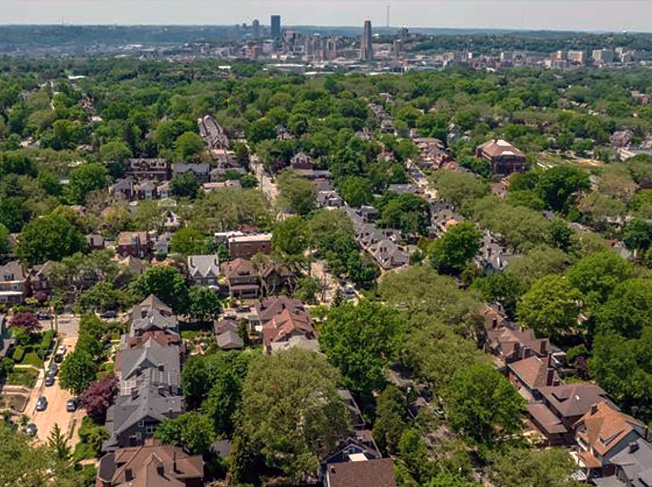8 Tips for Maintaining Your Trees
Squirrel Hill boasts one of the largest planted tree canopies in the City of Pittsburgh. While the Citywide tree canopy average is 42%, over 50% of Squirrel Hill is tree-covered. This is largely due to the love and care that homeowners show to their own trees. Investing in their care yields a significant return as trees improve quality of life and provide economic benefits. They provide cooling shade in the summer, cutting energy costs, and they provide beauty which increases property values. Trees clean the air, capture stormwater runoff, and buffer noise from traffic. Trees and parks are a point of pride for Squirrel Hill residents and a big reason why people are attracted to the area.
Here are 8 great tips for keeping your trees healthy year round:
1. Regularly inspect your tree for signs of stress. These include: pest holes and feeding, canopy dieback, leaf spots, leaf discoloration, bark damage, dead branches and fungi.
2. Mulch your tree. Mulch provides essential nutrition for your tree and a healthy tree is better equipped to fight off pests and disease. Be sure to leave room between the base of the trunk and the mulch to avoid the “volcano” shape that can lead to bark decay.
3. If you suspect something is wrong with your tree, contact a tree care company that employs an ISA Certified Arborist. Visit www.isaarbor.com to find an ISA Certified arborist in your area.
4. Pruning of certain species at certain times of the year could be beneficial or detrimental to the tree. Species like oaks, elms, and London plane trees should only be pruned in the winter months to avoid the spread of disease.
5. Be sure that your contractor sanitizes all tools before working on your tree. In certain instances, tools should be sanitized in between pruning cuts. Details of tool disinfection should be included in the contact’s scope of work.
6. Before work begins, be sure to request proof of your contractor’s liability insurance and workman’s compensation insurance.
7. Be aware of how home renovations might impact your tree’s health. Brick cleaning, chemical excavation, and soil compaction can all negatively impact your tree. Be sure to request that your contractor take precautions as they work.
8. Educate yourself by becoming a certified Tree Tender. Visit www.treepittsburgh.org to learn more and register. For another great resource, visit www.treesaregood.org for more detailed tree owner information.
As important as maintaining trees, is planting new trees. A healthy urban forest is one with trees that range in age and species diversity. Homeowners must consider carefully what species and location are most appropriate before planting. Underground utilities must be identified by calling PA One Call at 811 and conflict with overhead lines should be avoided. An ISA Certified Arborist or other trained landscape professional can consult on what species is best for the site. To learn proper planting techniques, visit www.treepittsburgh.org, become a Tree Tender, or volunteer with a local tree planting organization to gain experience. Consider working alongside your neighbors to apply for street trees through the TreeVitalize Pittsburgh program. The application can be found at www.waterlandlife.org/216/treevitalize.
Someone is sitting in the shade today because someone planted a tree a long time ago.
-Warren Buffett
By Danielle Crumrine, Tree Pittsburgh


